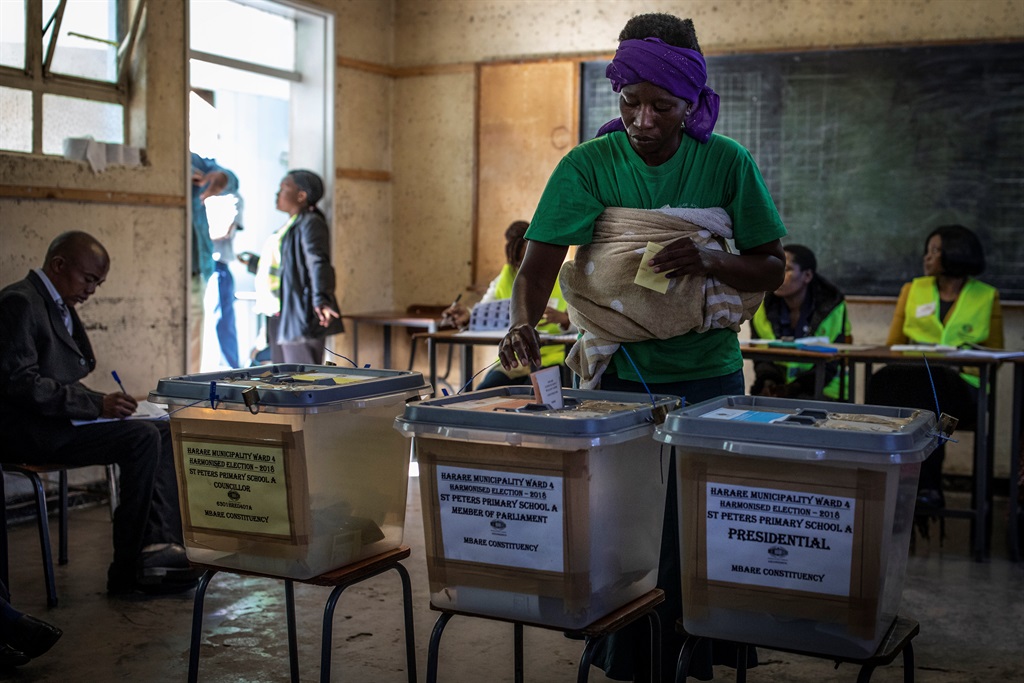
- A video of policemen beating up CCC supporters for holding “car rallies” has surfaced on social media.
- CCC is to hold a rally on Sunday in Harare, but police warned the party not to bus supporters from around the city.
- The electoral body suspended workers for “leaking” the voters’ roll to the opposition and defends hiring Central Intelligence Organisation operatives.
A video of policemen allegedly assaulting suspected supporters of Nelson Chamisa’s Citizens Coalition for Change (CCC) in Harare has surfaced on social media.
The CCC members stand accused of holding “car rallies”, a new phenomenon on the political landscape, that the Zimbabwe Republic Police (ZRP) has since outlawed.
“The Zimbabwe Republic Police has noted with concern the conduct by some politicians and supporters who are holding car rallies and in the process block traffic thereby interfering with the smooth flow of traffic in urban areas,” the police said.
Thirteen CCC supporters who were arrested and allegedly brutalised by the police in the said video appeared in court on Saturday.
Harare Magistrates Court’s Yeukai Nzuda ended court proceedings before the 13 could apply for bail. She said she was “tired”. With Monday being a public holiday in Zimbabwe, they would remain in custody and will be back in court on Tuesday.
CCC supporters said the sudden harsh treatment from the police was meant to thwart Sunday’s CCC rally to be held in Harare’s Highfield suburb.
Police also issued a statement saying while the CCC rally was granted permission, the party was not allowed to provide transport for its supporters.
“Bussing in of people from other constituencies is strictly prohibited. Your members shall not be involved in any toyi-toying, convoying of vehicles of people chanting slogans and singing.
“Any deviation from the above will result in police dispersing your gathering,” the police said in a cautionary note to the CCC.
The ruling Zanu-PF had held a series of rallies in the past two weeks across the country. The party too, claimed to have been victims of political violence at the hands of CCC supporters in Bulawayo.
“They were attacked by people throwing stones (in Bulawayo) and others using catapults. We have several cases of injuries as a result of that,” Zanu PF’s political commissar Mike Bimha said addressing a press gathering in Harare.
The by-elections are a high-stakes event in Zimbabwe politics. They serve as a dress rehearsal for the general elections due to be held in 2023.
There’s a total of 133 elective vacancies that have to be filled – they comprise 28 parliamentary seats and 105 council seats emanating from recalls, deaths, and dismissals.
With a history of alleged electoral manipulation, civic society groups through monitoring the voters’ roll, raised the alarm over ghost voters and unexplainable registered voters.
Pachedu, a local think tank, did ground checks at one house in Glenview 1 Harare where it was discovered that only five people lived there. But the voters’ roll reflected that 30 registered voters lived at the house. The house belongs to Misheck Chisvo, a Zanu-PF primary election candidate for Glenview South.
After the exposé, ZEC suspended officials who gave the opposition and Pachedu access to the voters’ roll.
“As a result of that incident, the commission has suspended some officials involved in the production of the voters’ roll while investigations are being carried out to establish the circumstances under which the alleged 2020 voters’ roll was issued without following proper [procedure],” said ZEC acting chief elections officer Jane Pamhidzirai Chigidji.
Some critics, including exiled former Zanu-PF minister Professor Jonathan Moyo, who, during the late president Robert Mugabe’s era oversaw the party’s election campaigns, raised the alarm over the role played by the Central Intelligence Organisation (CIO) in the upcoming by-election.
While ZEC claimed there was nothing illegal about it, critics referred to s.208(4) (of the Electoral Act) which states that members of the security services “must not be employed or engaged in civilian institutions except in periods of public emergency”.
CIOs are members of the security services and an election is not a period of emergency.


